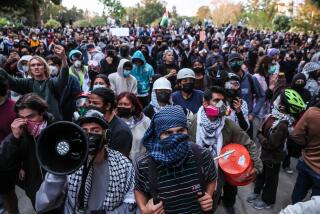$100,000 From Newport Couple : Gift Lifts UCI Hope for a Peace Institute
- Share via
A $100,000 gift from a former Air Force officer and his wife has given a push to UC Irvine’s embryonic plans for building an international peace research institute on its campus.
“All universities are searching for the appropriate way in which they can maximize their contribution to help resolve these very difficult issues of war and peace,” UCI Chancellor Jack Peltason said this week. “I would hope that this campus can be one of the leaders.”
UCI officials said the idea to create a separate academic program and building for the study of global conflict had been kicked around for several months by a group of faculty members before Thomas and Elizabeth Tierney of Newport Beach approached the chancellor with a similar idea and seed money.
In response to the Tierneys’ offer, Peltason appointed a three-member committee to explore the feasibility of building such a facility on campus and whether foundations and other private donors in Orange County and elsewhere would support the effort.
Headed by John Whiteley, a professor of social ecology, the committee will use the $100,000 to analyze the cost, funding and design for such a project.
“My personal desire is that this institute will create paths to peace and prevent a nuclear holocaust so that man will survive as a race,” said Thomas Tierney, 47, a self-described “hawk-turned-rational dove,” whose 11-year military stint included maintaining and loading nuclear weapons.
“Looking back upon those experiences strongly suggests that the engine that drives our sense of freedom is more oriented towards the perpetuation of bureaucracies . . . than person-to-person compassion and understanding,” he said.
Tierney, now the president of Vita Tech, a vitamin manufacturing company in Tustin, said he began thinking about a peace research institute at UCI when he heard a talk last year by members of Beyond War, an international group of peace advocates.
“It drove home the point about nuclear escalation so dramatically that I was never able to let go of the thought,” he said.
Neither have many University of California faculty members.
With the 1983 establishment of a multicampus research unit called the Institute on Global Conflict & Cooperation, UC faculty from a broad range of disciplines have been teaching, researching and hosting seminars throughout the nine-campus system on the dangers and avoidance of nuclear war.
“There is no central place where they can get together,” Whiteley said, “and the funds are not sufficient to give it (the Institute on Global Conflict) the academic support that such a serious problem requires.”
Although more than a dozen similar research institutes exist on campuses across the nation, including the Hoover Institute of War, Revolution & Peace at Stanford University in Palo Alto, Whitely said that UCI, with its rich intellectual talent, was in a unique position to make a contribution to the war-and-peace debate.
“Armed conflict has regrettably been a tradition, but there are a lot of exciting ideas out there to lower the risks of nuclear war and to solve the problems that technology has created and can’t solve. Second, by taking the top 12.5% of the high school graduating classes, every year we are training the leaders of the 21st Century. We’d like to be able to contribute better to their education on this significant topic.”
Whitely said his group is in the process of drafting a report to “identify the kind of steps that need to occur in order to move this idea along to bricks and mortar.” He said he hopes to have a detailed analysis on the chancellor’s desk in a few weeks.
More to Read
Sign up for Essential California
The most important California stories and recommendations in your inbox every morning.
You may occasionally receive promotional content from the Los Angeles Times.













